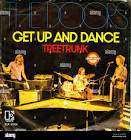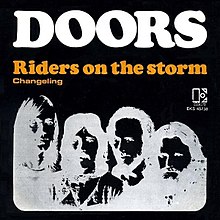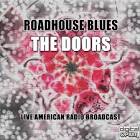Get Up and Dance
| Get Up and Dance | |
|---|---|
 | |
| Developer(s) | Gusto Games[1] |
| Publisher(s) | O Games[2] |
| Platform(s) | PlayStation 3, Nintendo Wii |
| Release | November 4, 2011 |
| Genre(s) | Rhythm game |
| Mode(s) | Single-player and multiplayer |
Get Up And Dance is a 2011 music rhythm game developed by Gusto Games and published by O-Games. The game was released on November 4, 2011 for both the Wii and PlayStation 3. Players mimic an on-screen dancer`s choreography for a selected song, using measurements from either the Wii Remote or the PlayStation Move controllers to judge player`s abilities.
Prior to release, O Games settled with the video game publisher Ubisoft after Ubisoft filed for a temporary restraining order against the US release of Get Up and Dance, due to the title of the game`s similarities to Ubisoft`s Just Dance series. Reception to the game was mixed, with critics noting a distinct lack of content when compared to Just Dance games.
Gameplay
[edit]After selecting a song, the player imitates dance poses made by a dancer on the screen.[3] During gameplay, music videos play in the background of the scene behind the virtual dancer.[3] Up to four players can play competitively at once.[3] The game includes either 25 or 40 songs in the tracklist from a wide variety of genres, and does not contain any cover songs.[3][4] A co-operative story mode allows players to dance together to work for a successful career.[4]
Development
[edit]Gusto Games and O Games announced Get Up and Dance in June 2011.[5] In an interview transcript released by the publisher, O Games, the producer of the game noted that Gusto Games had never worked on a dance game before and that they used green screens to record dancers for the gameplay videos.[6] Ubisoft unsuccessfully filed for a temporary restraining order against O Games to stop the game`s United States release because of the similarities to the Just Dance series.[7][8] United States district court Judge Charles Breyer ruled that "Ubisoft has not clearly demonstrated likelihood they are substantially similar."[8] Ubisoft noted its intent to appeal the decision, but the game was able to be released in the US.[9]
Reception
[edit]The game received mixed reviews from critics, who felt it was released among a plethora of other music and rhythm titles that compared unfavorably towards competitors.[3][4] The Guardian`s Sarah Ditum said in a review of the Wii version that Get Up and Dance is an "unremarkable package" and noted the "inconsistency across a limited tracklist."[3] Push Square`s James Newton in a mixed review noted that the game "takes Just Dance as its template" and that "it sticks closer than most."[4] Newton also noted the quantity of other PlayStation Move dance titles that were being released and felt that Get Up and Dance was not unique enough to be successful.[4] Nintendo Gamer criticized the game`s instructions, saying that the prompts for dance moves was unclear and compared it unfavorably to Just Dance.[10]
References
[edit]- ^ "Modern Hits Tracks Confirmed For Get Up and Dance - IGN". Uk.ign.com. 16 August 2011. Archived from the original on 10 April 2023. Retrieved 26 June 2017.
- ^ "Get Up and Dance". GameSpot. 10 November 2011. Archived from the original on 11 December 2011. Retrieved 26 June 2017.
- ^ a b c d e f Ditum, Sarah (14 November 2011). "Get Up and Dance – review". The Guardian. ISSN 0261-3077. Archived from the original on 30 March 2023. Retrieved 30 March 2023.
- ^ a b c d e Newton, James (8 November 2011). "Review: Get Up and Dance (PlayStation 3)". Push Square. Archived from the original on 30 March 2023. Retrieved 30 March 2023.
- ^ IGN Staff (3 June 2011). "Get Up and Dance Announced". IGN. Archived from the original on 30 March 2023. Retrieved 30 March 2023.
- ^ Seedhouse, Alex (13 October 2011). "Q&A: Get Up and Dance". Nintendo Insider. Archived from the original on 30 March 2023. Retrieved 30 March 2023.
- ^ Keitzmann, Ludwig (6 December 2011). "Court denies Ubi`s request to restrain Get Up and Dance". Engadget. Archived from the original on 30 March 2023. Retrieved 30 March 2023.
- ^ a b MCV Editors (15 May 2019). "OG wins court battle". MCV. ISSN 1469-4832. Archived from the original on 30 March 2023. Retrieved 30 March 2023.
- ^ Rose, Mike (6 December 2011). "Court Denies Ubisoft Restraining Order Over Get Up And Dance". Game Developer.
Review
2011 video game
Get Up and Dance Developer(s) Gusto Games[1] Publisher(s) O Games[2] Platform(s) PlayStation 3, Nintendo Wii Release November 4, 2011 Genre(s) Rhythm game Mode(s) Single-player and multiplayer Get Up And Dance is a 2011 music rhythm game developed by Gusto Games and published by O-Games. The game was released on November 4, 2011 for both the Wii and PlayStation 3. Players mimic an on-screen dancer`s choreography for a selected song, using measurements from either the Wii Remote or the PlayStation Move controllers to judge player`s abilities.
Leer másPrior to release, O Games settled with the video game publisher Ubisoft after Ubisoft filed for a temporary restraining order against the US release of Get Up and Dance, due to the title of the game`s similarities to Ubisoft`s Just Dance series. Reception to the game was mixed, with critics noting a distinct lack of content when compared to Just Dance games.
Gameplay
After selecting a song, the player imitates dance poses made by a dancer on the screen.[3] During gameplay, music videos play in the background of the scene behind the virtual dancer.[3] Up to four players can play competitively at once.[3] The game includes either 25 or 40 songs in the tracklist from a wide variety of genres, and does not contain any cover songs.[3][4] A co-operative story mode allows players to dance together to work for a successful career.[4]
Development
Gusto Games and O Games announced Get Up and Dance in June 2011.[5] In an interview transcript released by the publisher, O Games, the producer of the game noted that Gusto Games had never worked on a dance game before and that they used green screens to record dancers for the gameplay videos.[6] Ubisoft unsuccessfully filed for a temporary restraining order against O Games to stop the game`s United States release because of the similarities to the Just Dance series.[7][8] United States district court Judge Charles Breyer ruled that "Ubisoft has not clearly demonstrated likelihood they are substantially similar."[8] Ubisoft noted its intent to appeal the decision, but the game was able to be released in the US.[9]
Reception
The game received mixed reviews from critics, who felt it was released among a plethora of other music and rhythm titles that compared unfavorably towards competitors.[3][4] The Guardian`s Sarah Ditum said in a review of the Wii version that Get Up and Dance is an "unremarkable package" and noted the "inconsistency across a limited tracklist."[3] Push Square`s James Newton in a mixed review noted that the game "takes Just Dance as its template" and that "it sticks closer than most."[4] Newton also noted the quantity of other PlayStation Move dance titles that were being released and felt that Get Up and Dance was not unique enough to be successful.[4] Nintendo Gamer criticized the game`s instructions, saying that the prompts for dance moves was unclear and compared it unfavorably to Just Dance.[10]
2011 video game
| Get Up and Dance | |
|---|---|
| Developer(s) | Gusto Games[1] |
| Publisher(s) | O Games[2] |
| Platform(s) | PlayStation 3, Nintendo Wii |
| Release | November 4, 2011 |
| Genre(s) | Rhythm game |
| Mode(s) | Single-player and multiplayer |
Get Up And Dance is a 2011 music rhythm game developed by Gusto Games and published by O-Games. The game was released on November 4, 2011 for both the Wii and PlayStation 3. Players mimic an on-screen dancer`s choreography for a selected song, using measurements from either the Wii Remote or the PlayStation Move controllers to judge player`s abilities.
Prior to release, O Games settled with the video game publisher Ubisoft after Ubisoft filed for a temporary restraining order against the US release of Get Up and Dance, due to the title of the game`s similarities to Ubisoft`s Just Dance series. Reception to the game was mixed, with critics noting a distinct lack of content when compared to Just Dance games.
Gameplay
After selecting a song, the player imitates dance poses made by a dancer on the screen.[3] During gameplay, music videos play in the background of the scene behind the virtual dancer.[3] Up to four players can play competitively at once.[3] The game includes either 25 or 40 songs in the tracklist from a wide variety of genres, and does not contain any cover songs.[3][4] A co-operative story mode allows players to dance together to work for a successful career.[4]
Development
Gusto Games and O Games announced Get Up and Dance in June 2011.[5] In an interview transcript released by the publisher, O Games, the producer of the game noted that Gusto Games had never worked on a dance game before and that they used green screens to record dancers for the gameplay videos.[6] Ubisoft unsuccessfully filed for a temporary restraining order against O Games to stop the game`s United States release because of the similarities to the Just Dance series.[7][8] United States district court Judge Charles Breyer ruled that "Ubisoft has not clearly demonstrated likelihood they are substantially similar."[8] Ubisoft noted its intent to appeal the decision, but the game was able to be released in the US.[9]
Reception
The game received mixed reviews from critics, who felt it was released among a plethora of other music and rhythm titles that compared unfavorably towards competitors.[3][4] The Guardian`s Sarah Ditum said in a review of the Wii version that Get Up and Dance is an "unremarkable package" and noted the "inconsistency across a limited tracklist."[3] Push Square`s James Newton in a mixed review noted that the game "takes Just Dance as its template" and that "it sticks closer than most."[4] Newton also noted the quantity of other PlayStation Move dance titles that were being released and felt that Get Up and Dance was not unique enough to be successful.[4] Nintendo Gamer criticized the game`s instructions, saying that the prompts for dance moves was unclear and compared it unfavorably to Just Dance.[10]








